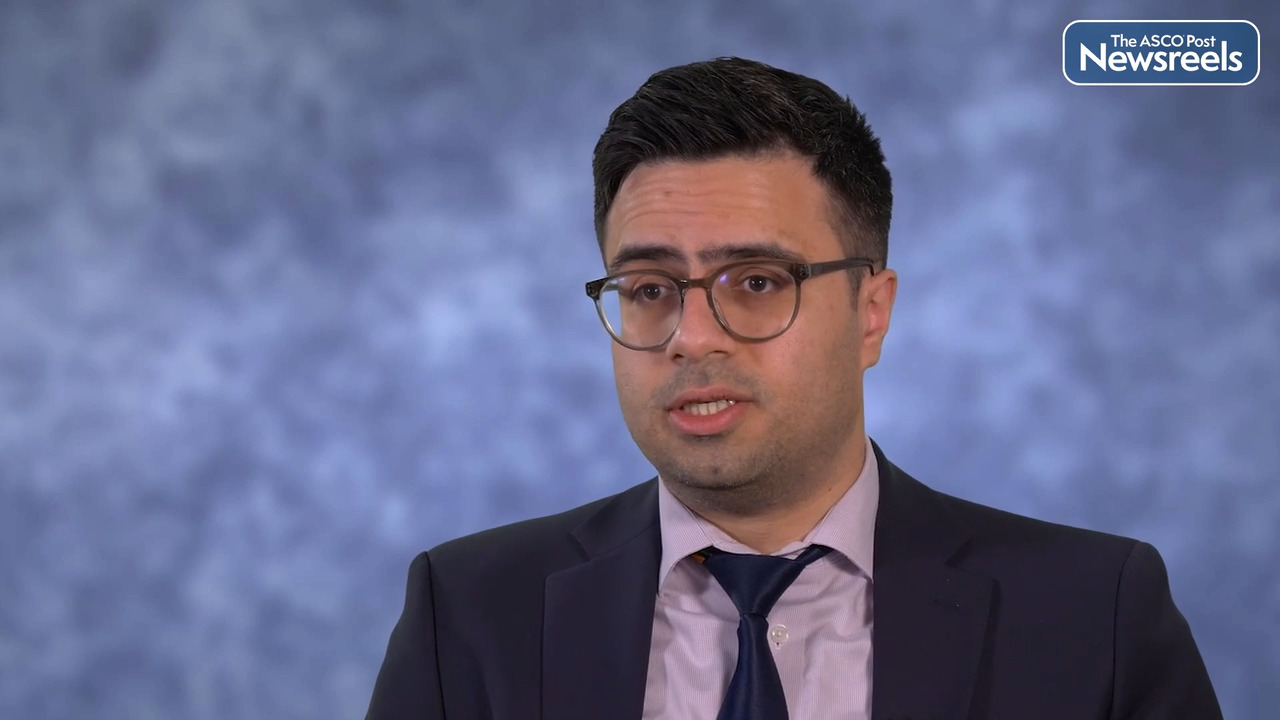Defensive Beliefs May Prevent Individuals From Partaking in Screening for Colorectal Cancer
Investigators have revealed that individuals who react defensively to an invitation for colorectal cancer screening may be less likely to take part, according to a new study published by Clarke et al in Cancer. Background Colorectal cancer is one of the most treatable cancer types—especially if...
Association of Radiation and Procarbazine Dose With Risk of Colorectal Cancer in Survivors of Hodgkin Lymphoma
In a Dutch study reported in JAMA Oncology, Geurts et al found a dose-response relationship between radiotherapy and risk of colorectal cancer among survivors of Hodgkin lymphoma, with the risk being increased with increasing procarbazine dose. Study Details The nested case-control study included...
Neoadjuvant Plus Adjuvant Chemotherapy vs Adjuvant Chemotherapy Alone for Locally Advanced Colon Cancer
As reported in the Journal of Clinical Oncology by Morton et al, the European phase III FOxTROT trial has shown that neoadjuvant plus adjuvant oxaliplatin/fluoropyrimidine resulted in a reduced risk of residual disease or disease recurrence vs adjuvant oxaliplatin/fluoropyrimidine in patients with...
Levels of Inflammatory Biomarkers and Survival in Patients Receiving Adjuvant Therapy for Stage III Colon Cancer
In a study reported in JAMA Oncology, Cheng et al found that higher levels of inflammatory biomarkers measured after surgery—but before receipt of chemotherapy—were associated with poorer outcomes in patients with stage III colon cancer enrolled in the CALGB/SWOG 80702 trial of adjuvant...
Immunotherapy Combined With Targeted Therapy in Patients With BRAF V600E–Mutated Colorectal Cancer
In one of the first clinical trials combining immunotherapy and targeted therapy for patients with BRAF V600E–mutated colorectal cancer, researchers discovered that a combination regimen of dabrafenib, trametinib, and spartalizumab resulted in long-lasting responses. The study findings published by ...
Julien Taïeb, MD, PhD, on Treating Colorectal Cancer With Trifluridine and Tipiracil Plus Bevacizumab
Julien Taïeb, MD, PhD, of Hôpital Européen Georges Pompidou, Université Paris-Cité, discusses the clinical implications of new phase III findings from the SUNLIGHT study, which showed that trifluridine and tipiracil (FTD/TPI) plus bevacizumab resulted in improved outcomes compared with FTD/TPI alone in patients with refractory metastatic colorectal cancer. This three-drug regimen may represent a new standard of care for patients whose cancer has progressed despite two lines of therapy (Abstract 4).
New Study Evaluates Online Colorectal Cancer Risk Calculators
Many individuals considering screening for colorectal cancer may want information on their personal risk when making decisions about screening—such as whether to select an at-home stool-based test or colonoscopy. Investigators evaluated five online colorectal cancer risk calculators to determine...
Trends in Stage, Treatment, and Outcomes in Rectal Adenocarcinoma in the United States: 2004 to 2019
In a retrospective, observational case series study reported in JAMA Oncology, Emile et al identified changes in the stage at diagnosis, treatments, and outcomes in U.S. patients with rectal adenocarcinoma diagnosed between 2004 and 2019. Study Details The study used National Cancer Database data...
Josep Tabernero, MD, PhD, on Colorectal Cancer: Recent Data on Treatment With Trifluridine and Tipiracil Plus Bevacizumab
Josep Tabernero, MD, PhD, of Spain’s Vall d’Hebron Institute of Oncology, discusses phase III findings from the SUNLIGHT study, which showed that trifluridine and tipiracil (FTD/TPI) plus bevacizumab resulted in improved outcomes compared with FTD/TPI alone in patients with refractory metastatic colorectal cancer. Improvements in survival occurred irrespective of tumor sidedness, RAS mutational status, and receipt of prior bevacizumab. This three-drug regimen may represent a new standard of care for patients whose cancer has progressed after two lines of therapy (Abstract 4).
Combination of Botensilimab and Balstilimab Shows Activity in Patients With Metastatic Microsatellite-Stable Colorectal Cancer
A combination of the next-generation immunotherapies botensilimab and balstilimab showed clinical activity in treating patients with refractory metastatic microsatellite-stable (MSS) colorectal cancer, according to new findings presented by El-Khoueiry et al at the 2023 ASCO Gastrointestinal...
FDA Grants Accelerated Approval to Tucatinib Plus Trastuzumab for Advanced HER2-Positive Colorectal Cancer
On January 19, the U.S. Food and Drug Administration (FDA) granted accelerated approval to the kinase inhibitor tucatinib (Tukysa) in combination with the monoclonal antibody trastuzumab for RAS wild-type, HER2-positive, unresectable or metastatic colorectal cancer that has progressed following...
Neoadjuvant Immunotherapy in Patients With Localized dMMR Colorectal Cancer
Investigators discovered that PD-1 inhibition prior to surgery may be effective for patients with localized mismatch repair–deficient or microsatellite instability–high (dMMR/MSI-H) colorectal cancer, according to a study published by Xiao et al in JNCCN–Journal of the National Comprehensive Cancer ...
Adagrasib With or Without Cetuximab in Previously Treated Patients With Metastatic Colorectal Cancer and a KRAS G12C Mutation
In the phase I/II KRYSTAL-1 trial reported in The New England Journal of Medicine, Rona Yaeger, MD, and colleagues found that the KRAS G12C inhibitor adagrasib showed activity alone and in combination with cetuximab in heavily pretreated patients with metastatic colorectal cancer and mutated KRAS...
Trends in Squamous Cell Carcinoma of the Anus Incidence and Mortality in the United States
In a study reported in the Journal of Clinical Oncology, Damgacioglu et al found that squamous cell carcinoma of the anus incidence and mortality rates increased in men and women aged ≥ 50 years at diagnosis between 2001 to 2005 and 2014 to 2018, with increases concentrated in Midwestern and...
ASCO Guideline Highlights Newest Breakthroughs in the Treatment of Metastatic Colorectal Cancer
A new ASCO guideline on the management of advanced colorectal cancer summarizes the latest treatments supported by quality data that could expand oncologists’ armamentarium and potentially improve survival outcomes.1 “[Colorectal cancer] remains the second-leading class of cancer deaths among men ...
Breast, Cervical, and Colorectal Cancer Screening Rates Before vs After the COVID-19 Pandemic
In a U.S. cross-sectional study reported in JAMA Oncology, Oakes et al found that as of December 2021, breast, cervical, and colorectal cancer screening rates remained below pre–COVID-19 pandemic levels, despite initial rebounds in some rates. Reduced screening rates were accompanied by reduced...
Potential Factors in Oxaliplatin-Induced Peripheral Neuropathy in Patients With Stage III Colon Cancer
In an analysis from the phase III CALGB (Alliance)/SWOG 80702 trial of adjuvant FOLFOX (fluorouracil, leucovorin, and oxaliplatin) for patients with stage III colon cancer reported in the Journal of Clinical Oncology, Lee et al found that longer duration of oxaliplatin treatment was associated with ...
Importance of Screening Programs in Diagnosing Cancer in Patients With Type 2 Diabetes
Researchers have discovered that patients with type 2 diabetes who develop cancer are more likely to be diagnosed with advanced disease if they do not undergo routine screenings, according to a new study published by Jansana et al in the European Journal of Cancer. The new findings were also...
The NordICC Trial: The Devil Is in the Details
Colorectal cancer ranks third among cancer deaths in both men and women in the United States, with an estimated 150,000 new cases and 52,000 deaths anticipated in 2022.1 Colorectal cancer rates have declined by approximately 2% per year from 2014 to 2018 in people older than age 50, which is...
Moderate Exercise May Help Reduce Inflammation, Increase Survival in Patients With Colorectal Cancer by Improving Gut Microbiota
After examining the impact of exercise on the gut microbiome of patients with cancer and reporting a positive association, researchers discovered that regular physical activity may extend the survival of patients with colorectal cancer, according to a new study published by Himbert et al in the...
Nationwide Study Finds Higher Rates of Cancer Mortality, Increasing Cases of Early-Onset Colorectal Cancer Among American Indian and Alaska Native Individuals
New findings revealed that overall cancer mortality among American Indian and Alaska Native patients was 18% higher than among White patients despite similar cancer incidence, according to a new study published by Kratzer et al in CA: A Cancer Journal for Clinicians. The findings included the first ...
Early Discontinuation of Full Treatment Regimen or Oxaliplatin Alone in Patients Receiving Adjuvant Oxaliplatin/Fluoropyrimidine Therapy for Stage III Colon Cancer
In a pooled analysis reported in the Journal of Clinical Oncology, Gallois et al found that early discontinuation of adjuvant oxaliplatin/fluoropyrimidine regimens—consisting of FOLFOX (infusional fluorouracil, leucovorin, and oxaliplatin) or CAPOX (capecitabine and oxaliplatin)—was associated...
Prevalence of Mismatch Repair Deficiency in Rectal Adenocarcinoma in a Prospective Screening Program
As reported in a letter published in The New England Journal of Medicine by Papke et al, data from a prospective biopsy screening program at a large gastrointestinal pathology group indicate that approximately 3% of rectal adenocarcinomas are mismatch repair (MMR)-deficient. Study Background As...
Phase III FRESCO-2 Trial of Fruquintinib Meets Primary Endpoint in Metastatic Colorectal Cancer
HUTCHMED (China) Limited recently announced that the global phase III FRESCO-2 trial evaluating the investigational use of the anti–vascular endothelial growth factor (VEGF) tyrosine kinase inhibitor fruquintinib met its primary endpoint of overall survival in patients with advanced, refractory...
Effect of Invitation to Colonoscopy Screening on Risk of Colorectal Cancer and Risk of Mortality: The NordICC Trial
In a pragmatic trial reported in The New England Journal of Medicine, Bretthauer et al, on behalf of the Nordic-European Initiative on Colorectal Cancer (NordICC) Study Group, found a reduced risk of colorectal cancer diagnosis but no significant reduction in disease-specific mortality among...
NICHE-2: ‘Unprecedented’ Waterfall Plot Achieved With Neoadjuvant Immunotherapy in dMMR Colon Cancer
Treatment with neoadjuvant immunotherapy in colon cancer resulted in major pathologic responses in 95% of patients, NICHE-2 investigators reported at the European Society for Medical Oncology (ESMO) Congress 2022.1 Additionally, after 4 weeks of nivolumab plus ipilimumab, 67% of patients with...
The NordICC Trial: The Devil Is in the Details
Colorectal cancer ranks third among cancer deaths in both men and women in the United States, with an estimated 106,000 new cases and 52,000 deaths anticipated in 2022.1 Colorectal cancer rates have declined by approximately 2% per year from 2014 to 2018 in people over the age of 50 years, which is ...
Use of Remote Interventions Increased Adherence to Cancer Screenings Among Women in Rural Areas
Studies show that rural populations experience greater cancer disparities across the cancer control continuum—from prevention and incidence to survivorship and mortality—compared with their urban counterparts. Those living in rural parts of the United States also tend to have lower cancer screening ...
Study Examines Efficacy, Cost of FIT vs Multitarget Stool DNA Testing for Colorectal Cancer Screening
Commercially available noninvasive screening tests for colorectal cancer—the fecal immunochemical test (FIT) and the Cologuard multitarget stool DNA test—are equally effective for screening patients with early-stage colorectal cancer. However, FIT costs about one-fifth of the multitarget stool DNA...
Timely Surveillance With Chest Imaging May Benefit Patients With Metastatic Colorectal Cancer
Patients with colorectal cancer who have certain clinical characteristics may benefit from more frequent chest imaging to help identify and target cancer that has metastasized to the lungs, according to a new study presented at the 2022 Scientific Forum of the American College of Surgeons Clinical...
Researchers Discover Predictive Biomarker of Response to Therapy in Patients With Microsatellite-Stable Metastatic Colorectal Cancer
Researchers have unmasked mutations in the RNF43 gene as predictive biomarkers of a response to treatment with anti-BRAF/EGFR combination therapy in patients with microsatellite-stable BRAF V600E–mutated metastatic colorectal cancer. Data showed that patients with tumors harboring loss-of-function...
S.M. Qasim Hussaini, MD, on Colon Cancer Treatment Outcomes and Historical Housing Discrimination
S. M. Qasim Hussaini, MD, of the Sidney Kimmel Comprehensive Cancer Center, Johns Hopkins Hospital, discusses findings from a nationwide study of the association between living in areas with discriminatory mortgage practices from the 1930s with present-day access to quality colon cancer care. The study underscores the importance of state- and federal-level practices on mortgage lending regulation and fair housing practices in determining equitable cancer risk, access to care, and outcomes (Abstract 69).
Effect of Social Factors on Cancer Screening Rates Across U.S. Counties
Populations in U.S. counties defined as more vulnerable based on social factors—including socioeconomic status and racial and ethnic minority status—may be significantly less likely to receive timely breast, cervical, and colorectal cancer screenings, according to a recent study published by Bauer...
NICHE-2: ‘Unprecedented’ Waterfall Plot Achieved With Neoadjuvant Immunotherapy in dMMR Colon Cancer
Treatment with neoadjuvant immunotherapy in colon cancer resulted in major pathologic responses in 95% of patients, NICHE-2 investigators reported at the European Society for Medical Oncology (ESMO) Congress 2022.1 Additionally, after 4 weeks of nivolumab plus ipilimumab, 67% of patients with...
Treatments and Outcomes for Locally Advanced Rectal Cancer in Patients Aged 80 and Older
In an analysis of National Cancer Database data reported in JAMA Surgery, Nassoiy et al found that neoadjuvant chemoradiation therapy followed by surgery was associated with higher rates of R0 resection and improved survival vs other treatments in patients aged 80 and older undergoing surgery for...
Historical Housing Discrimination May Adversely Affect Contemporary Colon Cancer Care and Outcomes
Recent findings showed that historical housing discrimination may negatively affect contemporary care and outcomes for patients diagnosed with colon cancer, according to a study by Hussaini et al in the Journal of Clinical Oncology. The findings were also presented at the 2022 ASCO Quality Care...
Julien Taïeb, MD, PhD, on Colorectal Cancer: Recent Findings on Avelumab vs Standard Second-Line Chemotherapy
Julien Taïeb, MD, PhD, of Paris Descartes University, discusses phase II results from the SAMCO-PRODIGE 54 trial, which shows the efficacy and safety of avelumab in the second-line treatment of patients with deficient DNA mismatch–repair microsatellite-instability metastatic colorectal cancer. According to Dr. Taïeb, the study indirectly suggests this population should be treated as soon as possible with an immune checkpoint inhibitor (Abstract LBA23).
Study Shows Many Patients Prefer Stool Test to Colonoscopy for Colorectal Cancer Screening
Three-quarters of surveyed people preferred to do a fecal immunochemical test (FIT) rather than undergo a colonoscopy for their regular colorectal cancer screening, according to a new Cedars-Sinai study published by Makaroff et al in Clinical Gastroenterology and Hepatology. “One of the big issues...
Precision Physical Activity Prescriptions May Improve Survival in Patients With Stage III Colon Cancer
Physical activity may be associated with improved outcomes for patients undergoing postoperative treatment for stage III colon cancer, according to findings from a new study out of Pennington Biomedical Research Center published by Brown et al in the Journal of Clinical Oncology. The study assessed ...
MSI-High Rectal Adenocarcinoma
This is Part 4 of Updates in Colorectal Cancer, a four-part video roundtable series. Scroll down to watch the other videos from this Roundtable. In this video, Drs. Cathy Eng, Arvind Dasari, and Smitha Krishnamurthi discuss the management of microsatellite instability (MSI)-high rectal adenocarcinoma. The patient is a 62-year-old man with a large fungating nonobstructive tumor 6 cm from the anal verge, which is invading the mesorectum, and with enlarged mesorectal and superior hemorrhoidal lymph nodes. Immunohistochemistry reveals a dMMR tumor with loss of MLH1/PMS2, MLH1 promotor hypermethylation, and a BRAF V600E mutation. The faculty discuss next steps for this patient, including the current standard of care of trimodality therapy for locally advanced rectal adenocarcinoma, as well as ongoing trials that are evaluating the possibility of de-escalating trimodality therapy by omitting radiation or surgery.
HER2-Positive Colorectal Cancer
This is Part 3 of Updates in Colorectal Cancer, a four-part video roundtable series. Scroll down to watch the other videos from this Roundtable. In this video, Drs. Cathy Eng, Arvind Dasari, and Smitha Krishnamurthi discuss the management of HER2-positive colorectal cancer. The patient is a 45-year-old man who presents to the clinic with diarrhea, constipation, and periodic blood in his stool over the past 6 months. Colonoscopy reveals a nonobstructing tumor 16 cm from the anal verge, and CT scans reveal bilateral liver metastases with a primary rectosigmoid cancer with bulky adenopathy, as well as nonspecific subcentimeter lung nodules. After starting a course of FOLFOXIRI and bevacizumab, next-generation sequencing reveals that the patient is HER2-positive. The faculty discuss the next steps for this patient in light of the recent MOUNTAINEER trial and discuss the role of HER2 positivity in colorectal cancer.
Role of Neoadjuvant Therapy in T4 Colon Cancer
This is Part 2 of Updates in Colorectal Cancer, a four-part video roundtable series. Scroll down to watch the other videos from this Roundtable. In this video, Drs. Cathy Eng, Arvind Dasari, and Smitha Krishnamurthi discuss the role of neoadjuvant therapy in T4 colon cancer. The patient a 65-year-old woman who is diagnosed with a moderately differentiated adenocarcinoma with a partial mismatch repair mutation; flexible sigmoidoscopy reveals an ulcerating fungating lesion about 20 cm from the anal verge, and CT scans show no evidence of distant metastatic disease. The faculty discuss the next treatment options for this patient, given that patients with T4 tumors typically have higher risk of recurrence. Dr. Krishnamurthi reviews the findings of the FOxTROT and OPTICAL trials, which evaluated preoperative chemotherapy in T4 colon cancer. The faculty also discuss the potential role of preoperative immunotherapy for pMMR colon cancer.
Role of Circulating Tumor DNA in Early-Stage Colon Cancer
This is Part 1 of Updates in Colorectal Cancer, a four-part video roundtable series. Scroll down to watch the other videos from this Roundtable. In this video, Drs. Cathy Eng, Arvind Dasari, and Smitha Krishnamurthi discuss the role of circulating tumor DNA (ctDNA) in early-stage colon cancer. The patient is a 48-year-old woman with low-risk stage II colon cancer who underwent right hemicolectomy with no signs of metastasis. Immunohistochemistry revealed intact mismatch repair protein expression, and circulating tumor DNA was negative. She presents to the clinic asking about the best course of action after her surgery. The faculty discuss the role of ctDNA in guiding therapy in patients with low-risk colon cancer in light of the recent DYNAMIC, CIRCULATE-Japan, and GALAXY studies.
Association of Distance to Treatment Facility, U.S. Region, and Insurance Status With Diagnosis of Advanced Colon Cancer
In a National Cancer Database analysis reported in JAMA Network Open, Brand et al found that patients with colon cancer who lived farther from their treatment facility and those with no insurance or Medicaid alone were more likely to present with advanced-stage disease. As stated by the...
ctDNA Analysis of Acquired EGFR Resistance Alterations With First-Line Cetuximab Plus Chemotherapy in Patients With Metastatic Colorectal Cancer
In a circulating tumor DNA (ctDNA) substudy from the CALGB/SWOG-80405/Alliance trial reported in the Journal of Clinical Oncology, Kanwal Raghav, MD, MBBS, and colleagues found that first-line use of the anti-EGFR antibody cetuximab combined with chemotherapy was associated with only a small number ...
Recurrence-Free Survival as Surrogate for Overall Survival in Patients Undergoing Resection of Colorectal Liver Metastases
In a single-center retrospective study and a separate meta-analysis reported in The Lancet Oncology, Ecker et al found low correlations between recurrence-free survival and overall survival among patients undergoing resection of colorectal cancer liver metastases. As stated by the investigators,...
Costs of Cancer Treatment for Younger, Privately Insured Patients
A new, large study led by researchers at the American Cancer Society (ACS) and The University of Texas MD Anderson Cancer Center showed the rising costs of cancer treatment led to increases in total costs of care, and when compounded with greater cost-sharing, increased out-of-pocket costs for...
Use of Trimodality Therapy in Stage II/III Rectal Cancer in the United States: 10-Year Period
In a retrospective cohort study reported in JAMA Oncology, Hagen F. Kennecke, MD, and colleagues found that among U.S. patients with clinical stage II/III rectal cancer diagnosed between 2006 and 2016 who received trimodality therapy, use of postoperative chemoradiation therapy (CRT) decreased and...
Acquired EGFR Inhibitor Resistance Alterations Identified in ctDNA Analysis in Patients With Refractory Metastatic Colorectal Cancer
In a study reported in the Journal of Clinical Oncology by Topham et al, circulating tumor DNA (ctDNA) analysis indicated significantly increased frequencies of multiple potential EGFR inhibitor resistance alterations among patients with refractory metastatic colorectal cancer with vs without prior ...
Early Research Identifies Effective Combination Immunotherapy for Subgroup of Patients With Metastatic Colorectal Cancer
A physician-scientist at City of Hope has identified a novel combination immunotherapy regimen—a triplet therapy consisting of regorafenib, ipilimumab, and nivolumab—that demonstrated significant response in patients with chemotherapy-resistant, microsatellite-stable metastatic colorectal cancer....








